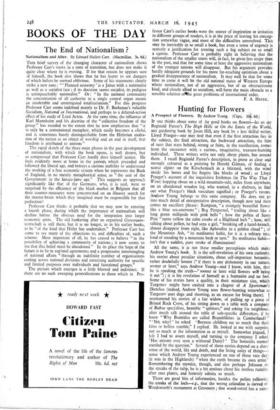BOOKS OF THE DAY
The End of. Nationalism ?
Nationalism and After. By Edward Hallett Carr. (Macmillan. 3s. 6d.)
This brief survey of the changing character of nationalism shows Professor Carr's views in a state of transition, but does not make it quite clear where he is moving. If for that reason he appears sure of himself, the book also shows that he has learnt to see dangers of which before he seemed oblivious. Some of his statements clearly strike a new note: "Planned economy' is a Janus with a nationalist as well as a socialist face ; if its doctrine seems socialist, its pedigree is unimpeachably nationalist." Or: "In the national community the concentration of all authority in a. single central ofgan means an intolerable and unmitigated totalitarianism." For this progress Professor Carr seems indebted mainly to Dr. F. Borkenau's valuable Socialism, National or International, and perhaps to a delayed-action effect of his study of Lord Acton. At the same time, the influence of Karl Mannheim and his doctrine of the "collective freedom of the group" has receded to the extent that he now emphasises that" it is only by a conventional metaphor, which easily becomes a click is) and is sometimes barely distinguishable from the Hiderian exalta- tion of the nation as an object of Worship and an end in itself, that freedom is attributed to nations" The rapid sketch of the three main phases in the past development of nationalism, with which the book opens, is well drawn, but so compressed that Professor Carr hardly does himself justice. He feels evidently more at home in the periods which preceded and followed the liberal age, and betrays a curious inability to understand the working of a free economic system when he represents the Bank of England, in no merely metaphorical sense, as "the seat of the Government. in the laissez-faire age." This suggests an approach significantly like that of the Germans, who, it is said, were so surprised by the efficiency of the black market in Belgium that all their counter-measures were concentrated on an illusory search for the master-brain which they imagined must be responsible for that perfection!
Professor Carr thinks it probable that we may now be entering a fourth phase, during whin the importance of nationalism will decline before the obvious need for the integration into larger economic units. The old hankering after an organised Grossraum- wirtschaft is still there, but it is no longer, as in his earlier books, to be "of the kind that Hitler has undertaken." Professor Carr has come to see many of the objections to, and difficulties of, such a scheme. Most important of all, he has ceased to believe "in the possibility of achieving a community of nations ; it now seems to me that this belief must be abandoned." In its place the hope of the future is to lie in-reg;onal agreements: and a progressive intermingling of national affairs "through an indefinite number of organisations cutting across national divisions and exercising authority for specific and limited purposes over individuals and functional groups."
The picture which emerges is a little blurred and indistinct.. If there are no such sweeping generalisations as those which in Pro- - fessor Carr's earlier books were the source of inspiration or irritation to different groups-of readers, it is at the *price of leaving his concep- tion somewhat vague, and most of the difficulties unresolved. This may be inevitable in so small a book, but even a sense of urgency is scarcely a justification for treating such a big subject on so small a canvas. Professor Carr is probably right in believing that the nationalism of the smaller states will, in fact, be given less scope than in the past, and that for some time at least the aggressive nationalism of the younger nations will disappear. But his argument provides hardly adequate grounds for his more far-reaching optimism about a gradual disappearance of nationalism. It may well be that for some time to come it will be the old national states of Western Europe where nationalism, not of an aggressive but of' an obstructionist kind, and closely allied to socialism, will form the main obstacle to a sensible solution offithe great problems of international order. • F. A. HAYEK.


























 Previous page
Previous page